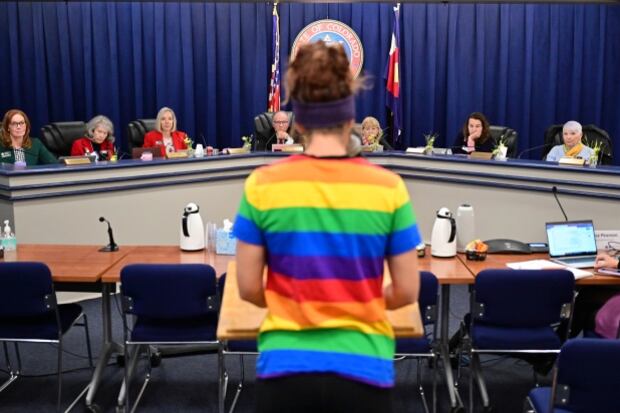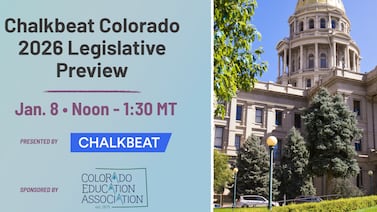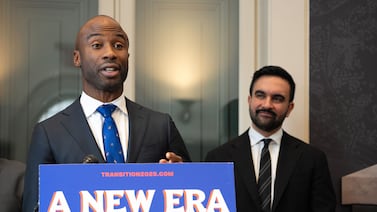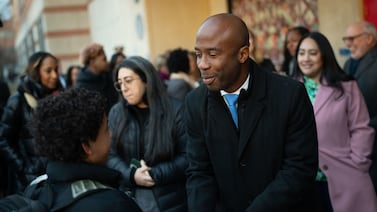Colorado’s State Board of Education split along party lines in two contentious decisions this fall. Republicans wanted to base Colorado civics lessons on the conservative American Birthright curriculum instead of on academic standards developed by Colorado teachers and community members. Democrats rejected the GOP effort outright.
Democrats also turned down an appeal from Ascent Classical Academy, siding with the Durango school board’s decision to reject a charter school that would have offered a classical education model based on curriculum from Hillsdale College, a Michigan Christian college.
The power to make these kinds of decisions — about what Colorado students should learn, when charter schools should open against the wishes of local leaders, and when low-performing school districts should lose some of their authority — are why observers across the political spectrum are calling this year’s State Board of Education races some of the most important on the ballot.
“Those who want to respect and uphold educator decision-making, our ability to teach an honest history, our students’ ability to be seen and represented — that’s at stake in this election,” said Amie Baca-Oehlert, president of the Colorado Education Association, the state teachers union.
“The big thing is parental rights and parental empowerment in this state,” said Bob Schaffer, a former Republican lawmaker and head of Liberty Common Charter School in Fort Collins. “On balance, when you look at the totality of all the incremental decisions that are made … the themes are state authority versus parental empowerment. And that’s what will tip or not.”
Colorado is one of seven states with an independently elected State Board of Education. The State Board is growing from seven members to nine due to Colorado’s growing population. Four seats are on the Nov. 8 ballot: two incumbents, a new seat in the 8th Congressional District, and a new statewide at-large seat.
In the at-large race, former Adams 12 school board President Kathy Plomer, a Democrat, is running against Republican Dan Maloit, a St. Vrain Valley parent who helped organize other parents in support of in-person learning.
In the new CD-8, representing Adams and Weld counties, Democrat Rhonda Solis, a former Greeley-Evans school board member and Latino community activist, is running against Republican Peggy Propst, who represented El Paso County on the State Board a decade ago and held a wide range of education jobs.
In the 6th Congressional District, representing Arapahoe County and southeast Denver suburbs, incumbent Democrat Rebecca McClellan is seeking a second term, while Republican Molly Lamar, a Cherry Creek parent and former teacher, hopes to replace her.
And in the 5th Congressional District representing Colorado Springs and El Paso County, incumbent Republican Steve Durham is running for re-election against longshot Democratic challenger Joseph Shelton, a campus security guard and LGBTQ community activist.
The election will determine whether Democrats keep the majority they’ve held since 2016 or Republicans take control. It comes at a time when education politics is increasingly polarized, as students and teachers are still recovering from pandemic disruptions, and as declining enrollment puts new budget pressures on many school districts.
Social studies standards turn into election issue
When Milo Marquez was growing up, he didn’t learn much about the long history of Hispanic communities in Colorado, and his 11-year-old son’s education doesn’t seem much better.
“Our communities have been here for centuries, but it is not taught that way,” said Marquez, who serves as chair of the Latino Education Coalition and director of the Latino Action Council at the advocacy group CLLARO.
That’s why these organizations have made more inclusive social studies standards an election priority this year. “We are very concerned that they are going to eliminate that history,” Marquez said. “We are going to lose another generation.”
The State Board is updating Colorado’s social studies standards to comply with several new state laws. The changes have divided the board, such as with the American Birthright proposal. Durham made changes to the Holocaust and genocide standards in hopes that students would think the Nazis were socialists.
Most of the debate concerns a 2019 law requiring the social studies standards to include contributions from ethnic and racial minorities and LGBTQ Americans. As Republicans in other states sought to restrict teaching about history, race, and gender, Colorado Democrats pushed in the other direction. But once draft standards were released, conservatives objected, calling the proposal divisive and suggesting it would require talking about sex.
The State Board has heard hours of public comment and fielded thousands of letters and emails. A standards committee already removed from the draft standards many references to race, racism and issues facing the LGBTQ community, resulting in a more generic document that state lawmakers say goes against their intent.
These changes are set to be finalized after the election but before the new board takes office in January. That’s turned the social studies standards into an election issue. Both Democratic and Republican members of the board plan to propose amendments, and the election results could send a message about public sentiment.
Lamar, the Cherry Creek parent and Republican CD-6 candidate, said the new board should make the final decision. She said labeling different groups leads to division, not inclusion.
As a bilingual kindergarten teacher in the Mapleton school district, “not one time did I know anyone’s sexuality. It didn’t matter,” Lamar said. “Not once did we talk about anybody’s race. It didn’t matter.”
McClellan said inclusion shouldn’t be a debate. “Humanity begins with basic acknowledgement of people’s existence,” she said. “We need to be inclusive, and we need to follow our obligation to the law.”
In CD-8, Democrat Solis supports reopening the debate if adopted standards aren’t inclusive enough. She was an adult, she said, before she learned that Colorado’s constitution was written in English, Spanish, and German, and a more diverse approach is one of her top priorities.
Republican Propst said she would move on, regardless of the outcome, but she also supports a much larger overhaul of state standards, including moving away from Common Core and promoting American exceptionalism. Propst also wants to “shift the focus from sexual issues back to basics.”
As a school board member, Plomer said parents of color told her how being nearly invisible in the curriculum affected their children, and she supports a more inclusive approach. But Plomer said she’ll respect the current board’s decision. Districts need to buy curriculum and train teachers, and the board has other work to do.
Maloit said he supports including diverse perspectives but worries about activism in the classroom and impinging on local control. He declined to answer a question about whether he’d seek to reopen the debate.
“We need a radical neutrality in the classroom, and I think our teachers can do that while still challenging our students,” he said.
A shift in the State Board would echo far beyond social studies instruction, said Van Schoales, senior policy director at the Keystone Policy Center and a longtime education advocate. Standards get reviewed on a rolling basis every six years, and politics are ever-present in views on whether climate change should be included in science standards or gun violence in health standards or whether the Common Core approach has been good or bad for learning.
“I think we would see a really different set of standards and not just in social studies,” Schoales said. “I think this would be reflected in science and in math. There are different perspectives among many folks in the Republican Party in terms of what kids should be learning.”
State Board role touches many education issues
Much of the State Board’s work is deep in the weeds. That’s exactly why it matters so much, said Bret Miles, executive director of the Colorado Association of School Executives.
CASE members are watching closely, for example, to see how services for students with disabilities will be provided under Colorado’s new universal preschool program or whether the definition of “seat time” will change to allow students to spend more time at apprenticeships without districts risking their funding.
“So many things that affect us on a daily basis happen in the rule-making process [at the State Board] and not at the legislature,” Miles said.
CASE is backing Plomer over Maloit in the at-large race, and McClellan over Lamar in the CD-6 race. Miles said CASE looked for candidates with a track record of engaging stakeholders and for candidates who focused more on local issues than a national agenda.
The State Board’s philosophical orientation matters as much as candidates’ positions on hot-button issues, advocates and candidates alike said. Plomer, for example, points to a track record of steady school improvement as a board member in a large district. Maloit, her opponent, says that as a parent of school-aged children, he’d bring more urgency to the job and more insight into how policies affect students.
Jen Walmer, Democrats for Education Reform’s state director, points to Colorado’s plan for distributing federal pandemic relief as an example of Democratic values. It addresses students’ academic and emotional needs, and it steers more money to schools where students have more need.
“I don’t think we would have seen that comprehensive approach if control had been different,” Walmer said.
The State Board also provides a platform. Schaffer, the charter school leader, said the State Board could have called loudly for in-person learning and empowered school districts to resist public health measures.
“This was a colossal mistake led by our governor with nary a whimper from our State Board of Education,” he said.
And the State Board provides a “backstop” when local school boards aren’t serving communities, said Nicholas Martinez of the advocacy group Transform Education Now.
“Your local board should be doing X, Y, Z, and if they are not, the State Board is where you can go.”
Charter schools seek a second chance at the State Board
Charter schools can appeal to the State Board of Education when school boards reject their applications. Democrats McClellan and board chair Angelika Schroeder often serve as the swing votes in these decisions. Colorado law says charter decisions should be based on the best interests of students and the community, which requires balancing competing interests.
Republicans who backed Ascent Classical Academy said parents need more options. Democrats gave more deference to the local school board.
But in another decision this fall, the State Board voted 5-2 in favor of a Denver charter school that aims to serve Black students with a culturally responsive curriculum. McClellan and Schroeder saw the school potentially addressing student needs.
Schaffer sees these charter decisions as one measure of how much the State Board respects parents’ authority to decide what’s best for their children’s education.
Brenda Dickhoner, president and CEO of the conservative education advocacy group Ready Colorado, said the State Board has been moderate but fears it could become less open to charter schools. Ready Colorado is backing Maloit in the at-large race.
Schoales agrees a Republican State Board would approve more charters in low-performing districts, but perhaps with less regard to the quality of the proposals.
Maloit said if charters can count on an open ear at the State Board, charters and districts have greater incentive to work out their differences.
Plomer said she wants to see charter schools making an effort to serve diverse student groups and offering solid business models.
“It doesn’t do anyone any good if we open a school, and it closes three years later,” she said.
Adams 14 intervention, school accountability decisions loom
The State Board oversees the school accountability system, rating schools and districts based on standardized test scores, offering help to low-performing districts, and ordering changes in districts that don’t improve. The State Board can take drastic steps, like closing schools, converting them to charter schools, or even dissolving and reorganizing districts.
But the Commerce City-based Adams 14 district has tested the bounds of State Board authority. The local school board is resisting state-ordered reorganization with support from neighboring districts.
An audit into whether the accountability system helps students is due in mid-November, and the legislature could take up proposals to give the State Board more or less authority.
Vernon Jones, a Denver parent, former school leader, and education advocate, sees myriad problems. Changes often depend on grant funding and are hard to sustain. Schools file mandatory improvement plans that sit on the shelf without review or enforcement. High-rated schools fail to serve students of color but face no consequences.
“The No. 1 thing is how the state is measuring quality and how the accountability system is working,” he said. “You can be a [high-rated] green school and have pretty big gaps, and that’s concerning.”
Maloit wants more help when schools begin to struggle, but is ready to close schools when student performance doesn’t improve.
“When you get to that point, it has to be firm,” he said. “It’s like with a kid. If it’s bedtime, it’s bedtime. It’s not 10 more minutes.”
Plomer pointed out most school districts do a poor job serving students in poverty and English learners, who make up the majority in Adams 14, but most escape scrutiny because higher-performing student groups obscure the gaps.
The State Board needs to look for ways to stabilize the district and reduce teacher turnover while also pressing for academic improvements, she said. Many Adams 14 parents enroll their children in other districts, but school choice alone won’t improve schools for those who remain, many of whom are fierce defenders of their district.
“Parents want their kids to go to school in their neighborhoods,” she said. “The parents who haven’t left want those schools to work.”
Bureau Chief Erica Meltzer covers education policy and politics and oversees Chalkbeat Colorado’s education coverage. Contact Erica at emeltzer@chalkbeat.org.





